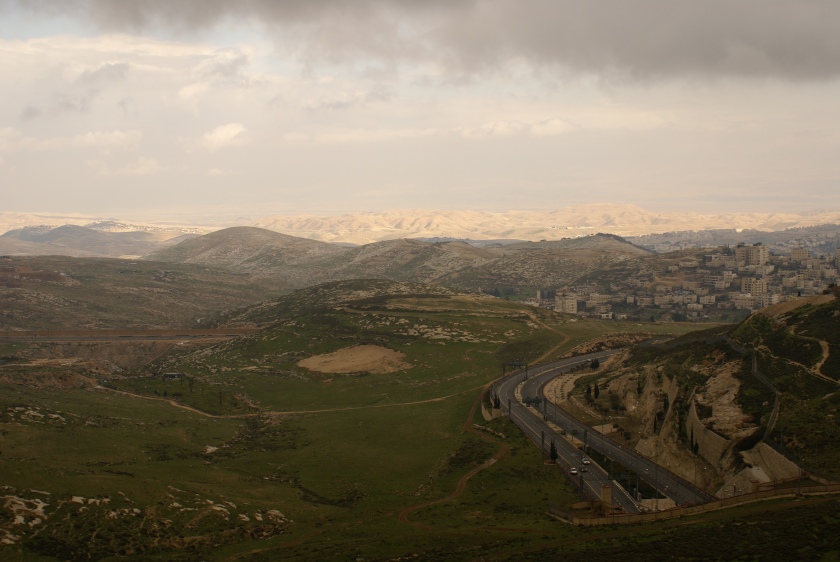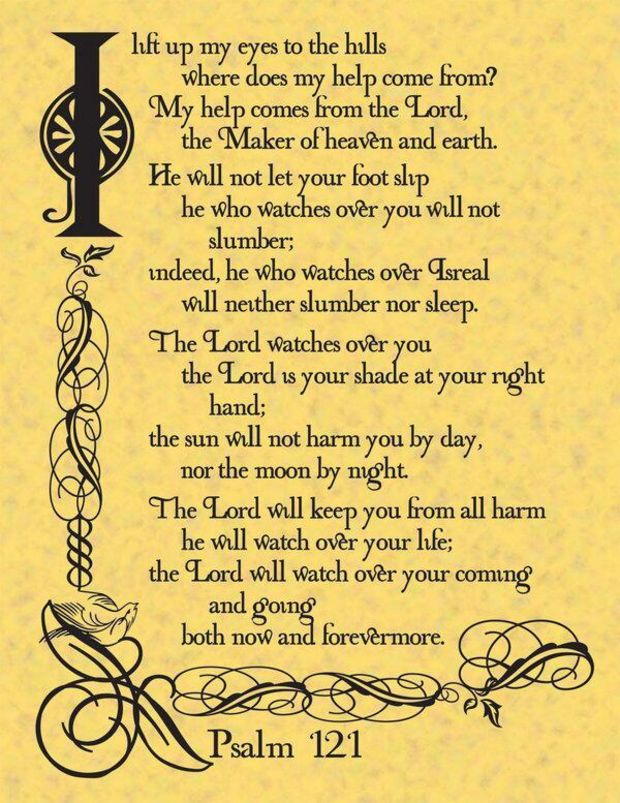In vv. 1–2, Psalm 121 begins with an individual in need of help, in much the same way that Psalm 120 expresses the plea of an individual in dire circumstances. Yet, unlike the previous psalm, here the psalmist declares a desire to look to the mountains and recognize whence personal help comes.[1]

Eyes Lifted to the Creator (vv. 1–2)
I lift up my eyes to the hills. From where does my help come?
My help comes from the Lord, who made heaven and earth.
Once again, as in 120:6–7, the poet binds these two verses together with step parallelism. The final word of v. 1 (“my help”) becomes the launching point for v. 2 (“my help”).[2] As such, the first two verses focus on identifying the psalmist’s help, namely, Yhwh, the Maker of heaven and earth.[3] The psalmist’s help comes from the covenant, creator God. The one who is there with the speaker is the same one who demonstrated his power by creating all things. The writer’s “hope is not in the mountains (v.1), but in the One who made the mountains.”[4] In another of the Songs of the Ascents, the congregation as a whole will echo this claim: “Our help is in the name of the Lord, who made heaven and earth” (124:3).
 As the Creator, Yhwh has the authority and ability to do what the psalmist claims in the rest of the psalm, as it moves from a first person wish to a description of Yhwh’s work on behalf of the one addressed as “you” in the next six verses.
As the Creator, Yhwh has the authority and ability to do what the psalmist claims in the rest of the psalm, as it moves from a first person wish to a description of Yhwh’s work on behalf of the one addressed as “you” in the next six verses.
Your Keeper (vv. 3–8)
The remainder of the psalm focuses on Yhwh’s relationship to Israel as her protector. In vv. 3–5, Yhwh is described as her “keeper,” while in vv. 7–8 the psalmist expresses confidence that Yhwh “will keep.” As discussed in the comments on Psalm 120 (part 2), there is a close relationship between the Songs of Ascents and the Priestly Blessing of Numbers 6:24–26. The use of the word for “keep” in Psalm 121 highlights this connection (“Yhwh bless you and keep you”).[5]
Poetically, the author has used the verb “to keep” to structure the parallelism of these verses. In vv. 3–5, there is a 3-fold use of the verb as a participle (“the one who keeps”). In vv. 7–8, the root is again used as an imperfect verb (“he will keep”). What is more, v. 5 makes two statements about Yhwh, placing his name in first position, as also occurs in vv. 7, 8. Structurally, then, this leaves v. 6 as the odd man out. However, in v. 6, the poet uses another literary device that is not readily obvious in English versions. The structure of the verse could be shown like this:
A By day
B the sun
C it will not strike you
B’ and the moon
A’ by night.
This is a common Hebrew poetic device known as chiasm, which is frequent in the Psalter but otherwise not used in this psalm. Normally, the focus of the chiasm is the middle element(s), which in this case would again be on the personal protection that Yhwh offers an individual, a theme upon which the psalm brings focus. This is true because Yhwh is not just the protector of Israel (v. 4: “he who keeps Israel”); his protection extends to the individual, as the constant repetition of “you(r)” indicates. Ten times in these six verses the psalmist uses a singular form of “you”:
- He will not let your foot be moved; he who keeps you will not slumber. (v. 3)
- The Lord is your keeper; the Lord is your shade on your right hand. (v. 5)[6]
- The sun shall not strike you by day, nor the moon by night. (v. 6)[7]
- The Lord will keep you from all evil; he will keep your (v. 7)[8]
- The Lord will keep your going out and your coming in from this time forth and forevermore. (v. 8)
Far from being an impersonal creator, Yhwh is a personal protector.[9] And this is a message that the psalm sounds like a constant drumbeat, reminding the readers (or hearers) of Yhwh’s protecting hand.

Summarizing the message of the psalm: For the psalmist and also for subsequent readers, confidence in help comes from embracing these facts:
- Help comes from Yhwh, the one who is present, who is there, and is in covenant with Israel.
- Help comes from the Creator of all things, the all-powerful God.
- Help comes from the one who, therefore, has the ability to keep (or protect) Israel. V. 4 is the only verse in vv. 3–8 that is not personalized to “you.”
- Help comes from the one who personally protects those who are his.
- Yhwh’s help extends from the present into the eschaton.
As such, the individual can take these second-person truths to his or herself; the “you” can become “me.” At the same time, the declarations of vv. 7–8 regarding Yhwh and the protection that he offers are by no means just hoping that he will protect. Rather it seems that these verses declare something that Yhwh does as part of who he is. In v. 7 and v. 8, the name Yhwh is given first position in the sentence, meaning that what is being said in these verses is stated about Yhwh.[10] They could be translated as follows:
As for Yhwh, he will keep you from all evil.
As for Yhwh,[11] he will keep your soul.
As for Yhwh, he will keep your going out and coming in.
Yhwh provides protection and preservation. Moreover, because Yhwh is the maker of heaven and earth (v. 2), he by authority and ability is one who can fulfill his promised protection. As such, this psalm gives an important commentary on (or exposition of) the Priestly Blessing: Saying “Yhwh bless you and keep you” is not just an empty saying expressing a petitioner’s wish. No, it is a blessing based on the unchangeable nature of their creator, covenant God. In other words, these are not just powerful wishes but divine promises of such blessings. Furthermore, according to the psalmist, Yhwh’s personal protection extends from the present into the eternal future (v. 8 “from now until forever”).[12] The psalm, in keeping with the theme of the Songs of Ascents, interprets the Priestly Blessing as extending from creation to the eschatological rebuilding of the Davidic kingdom.
The reader can thus look with certainty toward the Keeper of Israel as the journey toward Jerusalem, the city of David, continues. The adjoining of Psalm 121 with Psalm 122 highlights this connection. Going to Jerusalem is a good thing because the house of Yhwh and the throne of David are there. Therefore, the peace sought by the speaker of Psalm 120 and the hope sought in the protection of Yhwh of Psalm 121 find their answer in the journey toward Jerusalem of Psalm 122.

Notes
[1] There is much disagreement over how this verse should be understood. Do the mountains represent a source of danger? Are the mountains seen negatively as sanctuaries of foreign gods? Are the mountains to be seen positively as the place where God is enthroned (123:1)? Is the reference to the mountains of Jerusalem or mountains along the path back to Jerusalem? I think the volitional use of the imperfect in v. 1 helps determine the intention. The psalmist expresses desire to lift his eyes to the hills, which appears to me to be a positive intention. Why would someone express desire to lift one’s eyes to an imminent threat? Perhaps Allen, 150 has an adequate translation: “I look up to the mountains to see where my help is to come from.”
[2] The English word order doesn’t allow this to be conveyed adequately. A more literal translation might be, “From where does it come, namely my help. My help comes ….”
[3] Zenger, 439, writes: “Die in Ps 121 gegebene Kombination von Schöpfungstheologie (V 1–2) und Geschichtstheologie (V 3–8)—deren Interdependenz ist typisch für das Gesamtkonzept der Priesterschrift—begegnet ebenso in Jes 40–55!” The combination of creation theology (vv. 1–2) and theology of history (vv. 3–8)—whose interdependence is typical for the entire program of the Priestly strand—is encountered as well in Isaiah 40–55!
[4] Sailhamer, 218.
[5] Quote Liebreich here on Psalm 120.
[6] This verse needs more explanation.
[7] This verse needs more explanation.
[8] The clearer statements of v. 7 shed light on the metaphorical ones in vv. 5–6.
[9] Note the interplay of the personal name of Yhwh and his designation as Creator in v. 2.
[10] Specifically, we have examples of compound nominal clauses in which the statements about Yhwh are nominalized.
[11] Although not there, it is implied in the parallelism of v. 7.
[12] The phrase “from now until forever” occurs in the Songs of Ascents in 125:2 and 131:3. The only other places it occurs are Pss 113:2; 115:18; Isa 9:6 [7]; 59:20–21; Mic 4:7. Each of these passages shares other connections with the Songs of Ascents. Interestingly, in Mic 4:7, it is Yhwh reigning on Mount Zion “from now until forever,” which echoes a theme inherent to the Songs of Ascents, as well. Mic 4:7 follows the clear eschatological hope of a return to a restored Zion where Yhwh dwells (quoted from Isaiah 2). It includes the phrase “the last days” (4:1), giving it eschatological implications. The context of Isaiah 9:6 also complements the Songs of Ascents in that it speaks of the king who sits on the throne of David “from now until forever.” This should be highlighted in the comments on 131:3, where Psalms 131–133 bring the role of David to attention. Also, Zion, a theme of the Songs of Ascents, appears in the context of the Isaiah 59 passage. Finally, the passages in Psalm 113 and 115 occur within the context of a call for blessing Yhwh.

3 thoughts on “Psalm 121”